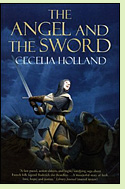The Angel and the Sword
by Cecelia Holland
Reviewed by Margaret Tomlinson

Based on an obscure French legend, The Angel and the Sword is a consistently suspenseful tale of a young woman who, disguised as a man, inspires the warriors of King Charles the Bald to defeat a group of Viking invaders besieging Paris in the year 861. Fictional characters mingle with the historical, all portrayed with a vividness that makes them spring off the pages.
Charles, who inherited a fraction of his grandfather Charlemagne's kingdom, rules his much-diminished realm from Paris, a shabby settlement on a riverbank vulnerable to Viking invasions. John Scot Eriugena, the Irish-born philosopher who is translating theological works from Greek into Latin for Charles, is brilliant and kind, with a gentle sense of humor. The Spanish princess Ragny, with a compelling reason to flee her father's court in boy's clothing, is a straightforward, practical thinker. Her naive piety carries her courageously in and out of danger with a particularly medieval flair. Battle scenes are tense, bloody and almost tactile as the characters face the violence of their world with fear, rage, exhilaration, exhaustion - the broad range of emotions soldiers experienced in a time when warfare was a constant, looming presence.
A central theme is the contrast between the instinctively worshipful form of prayer Ragny learned in childhood and the orthodox form taught by the monk Deodatus, echoed by the very different theological perspectives of the historical John, whose works went in and out of style over the centuries and were sometimes considered heretical, and Deodatus, whose approach to religion may remind readers of modern right-wing fundamentalists. As in Holland's other novels, history is reflected not only in the details of the characters' physical world but also in their inner psychological landscapes. The Angel and the Sword includes supernatural elements similar to those in Holland's more recent "Soul Thief" series, reflecting belief patterns true to the novel's setting and seamlessly integrated into a story of gritty realism. (2000, 304 pages)
More about The Angel and the Sword at Amazon.comOther novels set in medieval France:
Women in the Wall by Julia O'Faolain (1975), about Radegund, one of the six wives of the sixth-century Frankish King Clothair I. More info
Charlemagne and Roland by Allan Massie (2007), the story of Charlemagne, as narrated by the tutor of the young Holy Roman Emperor Frederick II. More info
The Oath-Takers by Naomi Mitchison, (1991), about a young Frank who travels to Spain in the unsettled years after the death of Charlemagne. More info
Nonfiction about Charles the Bald and John Scot Eriugena:
Charles the Bald by Janet L. Nelson (1992). More info
The Carolingians: A Family Who Forged Europe by Pierre Riché (1993). More info
John Scottus Eriugena by Dierdre Carabine (2000). More info
Online:
Johannes Scotus Erigena at the Notable Names Database website
Back to Medieval: 6th-11th Centuries
Back to Directory of Book Reviews